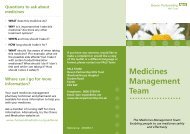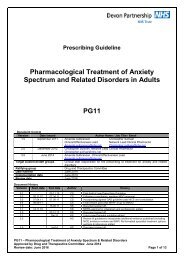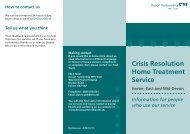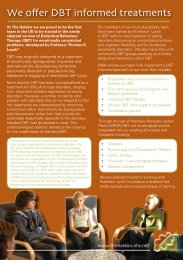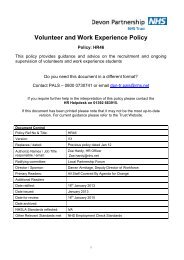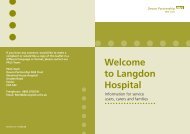Board of Directors Meeting - 29 March 2012 - Devon Partnership ...
Board of Directors Meeting - 29 March 2012 - Devon Partnership ...
Board of Directors Meeting - 29 March 2012 - Devon Partnership ...
- No tags were found...
You also want an ePaper? Increase the reach of your titles
YUMPU automatically turns print PDFs into web optimized ePapers that Google loves.
<strong>Board</strong> <strong>of</strong> <strong>Directors</strong> <strong>Meeting</strong>, <strong>29</strong> <strong>March</strong> <strong>2012</strong>Agenda Item 4a (Minute 033/12 refers)Appendix 1We also saw clear organisational objectives from top-to-bottom – widely understoodby everyone. There was an obvious willingness, and even eagerness, on the part <strong>of</strong>senior clinicians to work with financial managers for the benefit <strong>of</strong> patients and thebottom line – and the huddle and staff compact approaches led to a palpable sense<strong>of</strong> team and shared ownership.Also striking was the widespread understanding among staff, at all levels, <strong>of</strong> theneed for high quality performance data and a preparedness to share it openly andwidely. Interestingly, 5% per annum was a common target for efficiency savings andaround 1-2% a common level <strong>of</strong> turnover to be set-aside to implement redesign andefficiency programmes.And what have we changed?At <strong>Devon</strong> <strong>Partnership</strong> NHS Trust we have fed-back our experiences from the PacificNorth West, in some detail, to our <strong>Board</strong> and Medical Advisory Committee. Many <strong>of</strong>the approaches and ideas that we learned about in the US were, in some form,already prominent in our collective thinking about how we tackle issues aroundproductivity, efficiency, long-term sustainability and staff engagement. What the visithas done is significantly sharpen our focus on where we should concentrate ourthinking and what we should do next to start achieving tangible results.Improving performance through the use <strong>of</strong> accurate and readily-accessible data hasbeen a major priority for our Trust for the last three years or more. We have alreadydeveloped our own dashboard and performance management system – calledORBIT – but we now recognise the benefits <strong>of</strong> sharing performance data morewidely and openly, and encouraging more widespread staff ownership <strong>of</strong> it. OurMedical Director and Safety Lead are currently looking at the use <strong>of</strong> publicly-situatedperformance dashboards around our organisation, for all to see, and we are activelytying this in to the development <strong>of</strong> regular team huddles.It would be all too easy for this to be perceived by staff as ‘the latest fad from the US’or something too ‘gimmicky’ for the NHS. I am pleased to report that the concepthas, in fact, been very warmly received and individual directorates are activelyexploring how they might employ it to the greatest effect.We have also invested quite heavily in our service redesign capacity. In particular,we have invested in the development <strong>of</strong> an internal Improvement Academy which isfocused on supporting team performance, enabling and equipping them tounderstand and improve their performance, safety and quality.We have also set an average 6% per annum cost improvement programme for thenext five years, and have recommended additional project management to deliveragainst this target. This has increased our overall investment in redesign andefficiency programmes by about 0.5% <strong>of</strong> our turnover, and it now stands at around1.5%.We are developing stronger and clearer accountability for performance in all parts <strong>of</strong>our organisation. We are striving to adopt a US-style ‘zero tolerance’ approach toPage 22 <strong>of</strong> 156



